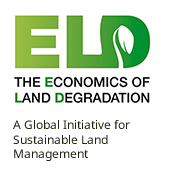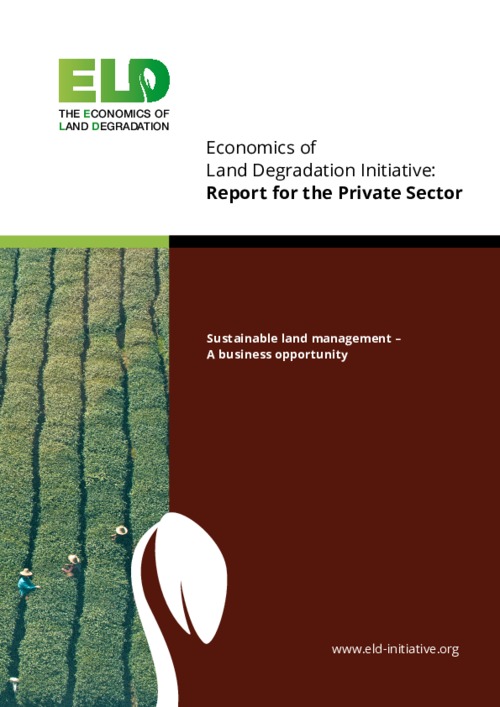Location
The Economics of Land Degradation (ELD) Initiative is an initiative on the economic benefits of land and land based ecosystems. The initiative highlights the value of sustainable land management and provides a global approach for analysis of the economics of land degradation. It aims to make economics of land degradation an integral part of policy strategies and decision making by increasing the political and public awareness of the costs and benefits of land and land-based ecosystems.
Our Vision
The partners’ vision of Economics of Land Degradation (ELD) Initiative is to transform global understanding of the value of land and create awareness of the economic case for sustainable land management that prevents loss of natural capital, secures livelihoods, preserves ecosystem services, combats climate change, and addresses food, energy, and water security, and to create capacity for the utilisation of economic information for sustainable land management.
Mission Statement
The central purpose and role of the Economics of Land Degradation (ELD) Initiative is that through an open inter-disciplinary partnership:
-
We work on the basis of a holistic framework built upon a recognized methodology to include the economic benefits of sustainable land management in political decision-making;
-
We build a compelling economic case for the benefits derived from sustainable land management from the local to the global level while applying a multi-level approach;
-
We estimate quantitatively the economic benefits derived from adopting sustainable land management practices and compare them to the costs of these practices;
-
We develop the capacities of decision-makers and land users through innovative formats to adapt and build their knowledge into national frameworks and action on the ground;
-
We stimulate the transformation towards land uses that provide fulfilling and secure livelihoods to all while growing natural capital, enhancing ecosystem services, boosting resilience and combating climate change;
-
We increase the awareness of the total value of land with its related ecosystem services;
-
We mainstream the full benefits of land in international and national land use strategies and action programmes by proposing effective solutions, tailored to country- or region-specific needs, including policies, and activities to reduce land degradation, mitigate climate change and the loss of biodiversity, and deliver food, energy, and water security worldwide.
Members:
Resources
Displaying 1 - 5 of 14Reversing Land Degradation in Drylands: The Case for Farmer Managed Natural Regeneration (FMNR) in the Upper West Region of Ghana.
The Lawra district of the Upper West region was selected as the case study. This study compared crop yields for FMNR and non-FMNR farmers. FMNR farmers are classified as having at least 8 trees per acre, with an average of 13 trees per acre (33 per ha) and a maximum of 40. Non-FMNR farmers are classified as having between 1 and 7 trees per acre, with an average of 5.Qualitative (focus group discussion) and quantitative (household survey) data were collected in April to May 2019. Over 500 households were interviewed in both CIKOD intervention communities and control sites.
Economics of Land Degradation Initiative: Report for the Private Sector
With around one third of the world’s arable land degraded, estimated annual losses of 6.3 to 10.6 USD trillion, and a projected need to increase food production from land by 70 per cent by 2050, we simply cannot afford to neglect the loss of potential production from careless land management. Whenever land is not producing at its potential,it is an under-performing asset that requires investments to ensure the future supply chains that many industries depend upon.
Value of Land: prosperous lands and positive rewards through sustainable land management
Understanding the cost of inaction and beneftis of action are important in order for all stakeholders to be able to make sound, informed decisions about the amount and type of investments in land they make. Even though techniques for sustainable land management are known, many barriers remain and the financial and economic aspects are often put forward as primary obstacles. If the full value of land is not understood by all stakeholders, it may not be sustainable managed, leaving future generations with diminished choices and options to secure human and environmental well-being.
ELD initiative : user guide
Land degradation and desertification reduce the provision of ecosystem services by lands and soils. This constrains development, reduces water, food, and energy security, and triggers resource conflicts. Although biophysical processes and economic impacts are increasingly understood, efforts to combat degradation have been failing thus far to prevent further losses of land productivity, a cost estimated at 42 billion USD/year (Dregne & Chou, 1992; Requier-Desjardins, 2007).
An Economic Valuation of agroforestry and land restoration in the Kelka forest in Mali_Assessing the socio-economic and environmental dimensions of land degradation
The Kelka forest in the Mopti region of Mali is important for the provision of ecosystem services like carbon sequestration and maintenance of the hydrological cycle. The Kelka forest area occupies more than 300, 000 hectares with 15
villages within and around its boundaries. The forest resources and soil fertility of the forest are in continuous decline due to a combination of climatic and human induced factors. For example, the availability of firewood has halved




